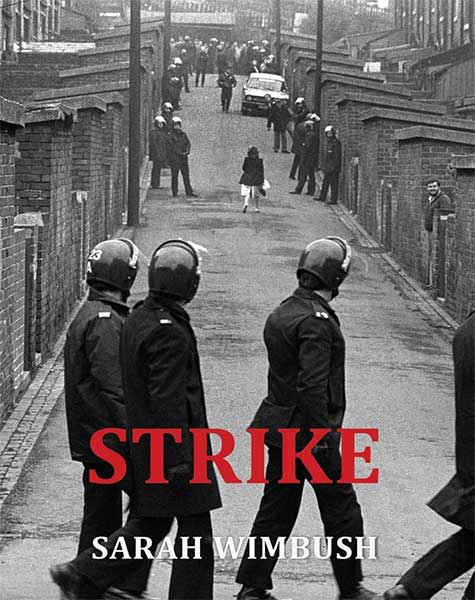
Strike, Sarah Wimbush (£15, Stairwell Books)
40 years on and the miners’ strike continues to be on the public’s mind. It united but also tore apart communities, it was only defeated by illegal police and government activities, it unified many in raising funds and support for those risking poverty and was the subject of intense nationwide debate and argument. In the end (on the back of MI5 snooping) Union funds got confiscated, violence ensued and defeated miners went back to work only to have their pits closed as ‘uneconomical’ and ‘unsustainable’. Whole villages and towns have still not recovered, unions have never quite found themselves able to unify their members as before (though visible campaigns continue for doctors and nurses, university staff and others), and the images of police in riot gear, assaulting unarmed workers exercising their right to strike and picket, will not go away.
Many of these images are in this new book, along with celebratory, elegaic, assertive and political poems. Many of Sarah Wimbush’s poems seem to riff on the accompanying photographs, exploring the humanity of those depicted. There is writing about the women support groups, miners receiving charitable handouts, rallies, and riots; but also benefit gigs, NUM membership cards, collecting scrap coal and graffiti, along with some more surprising images: a police inspector giving an injured miner the kiss of life and what appears to be a friendly football match between police and miners.
The book is full of the complex personal lives of the time, the contradictions of workers desperate to keep and save their appallingly hard and poorly-paid jobs, those who chose to not strike and go to work, how each side became ‘The Enemy’ to the other:
Enemy behind a riot shield
Enemy by the gate
Enemy driving a coal truck
Enemy on a plate
[…]
Enemy ditch their epaulettes
[…]
Enemy bends every law
The figurehead of authority at the time was, of course, Margaret Thatcher; much of what happened was the result of her direct interference and planning, but she was also a scapegoat for the Tories, who in time would stab her in the back, as politicians are wont to do with their leaders. Here, Wimbush starts her poem ‘Thatcher’, with the image she presented at the time:
Her Majesty
of backcomb and pearls.
Blonde bombshell, iron-handbagged
and twice the man.
before questioning some of the prime minister’s assertions:
Who is the mob?
Who is the enemy within?
before drawing the poem to a close with the image of ‘her bloody woman’s hands.’
I like the blurring here of bloody woman and bloody hands, and the way Wimbush captures details, to make it all personal rather than simply reiterating the slogans and media manipulations of the day. This book does not indulge in the pathos of Brassed Off, nor the musical conceit of Billy Elliot: however good those films may be they rarely depict the tragic and complex realities of this major industrial dispute, which was soon followed by other events such as the Battle of the Beanfield (where the police once more indulged in illegal violence) and changes to the laws dealing with protest, striking and people gathering together.
Strike is an important book which challenges the ‘Lies. Lies and more bollocks’ the media and politicians fed us at the time, and which continue to be recycled today. It is a passionate, engaged and engaging retelling of recent history, of a time when neoliberalism did not yet have the influence and control it does today. It stands as a reminder and challenge to us all to speak and act together rather than simply do what is expected or what we are told to do.
Rupert Loydell
Miners’ Strike 1984-85 poetry-film, The Flat Cap by Sarah Wimbush
(This review first appeared at Tears in the Fence)

As someone with a Grandad who spent most of his life down a pit, quite often in a 3 or 4 foot in height pit to work in, which frequently caved in, I think this is something that needs to be addressed regarding the unfairness this country is built on. And then fighting for his country and marched half starved to Poland to be incarcerated in a Prisoner of War camp, and never rewarded or thanked on his return, only to return to the pits. Mining was the most barbaric of occupations and I for one wasnt sad when it all ended, just sorry that those employed werent helped into other occupations, which they should have been, or otherwise handsomely rewarded for heroic services to this country and for keeping the developing world warm. Not just thrown on the scrapheap and left for dead.
The north of England should be one of the most prosperous places in the world, giving us coal, steel, ships, trains and much more: human sweat, strength, energy, innovation and endurance changing the entire world. Switzerland is one of the most prosperous places on earth, and it’s given us cuckoo clocks and banks. Something doesnt add up.
If these facile politicians are serious about levelling up and reparations, they should not look first to foreign lands, but to the home turf of the north of England, where much of the wealth this country was built on was produced. When this is addressed, perhaps we will finally become a United Kingdom.
Comment by Claire on 17 March, 2024 at 1:43 am